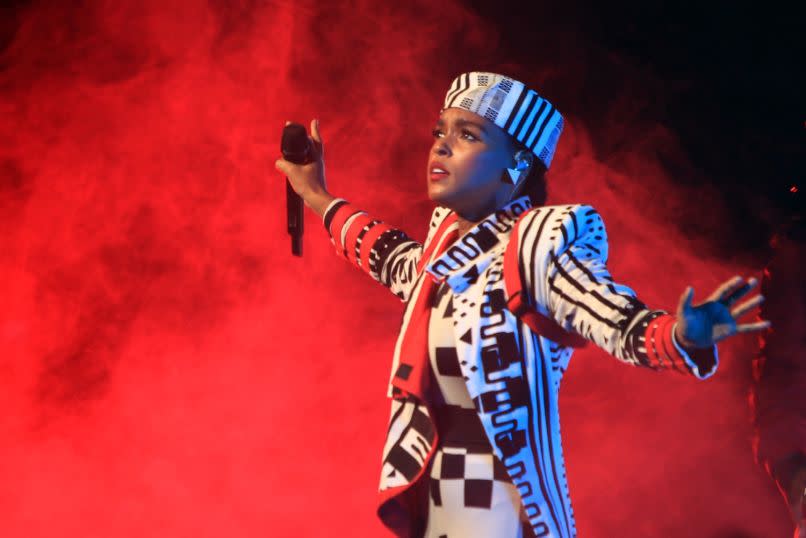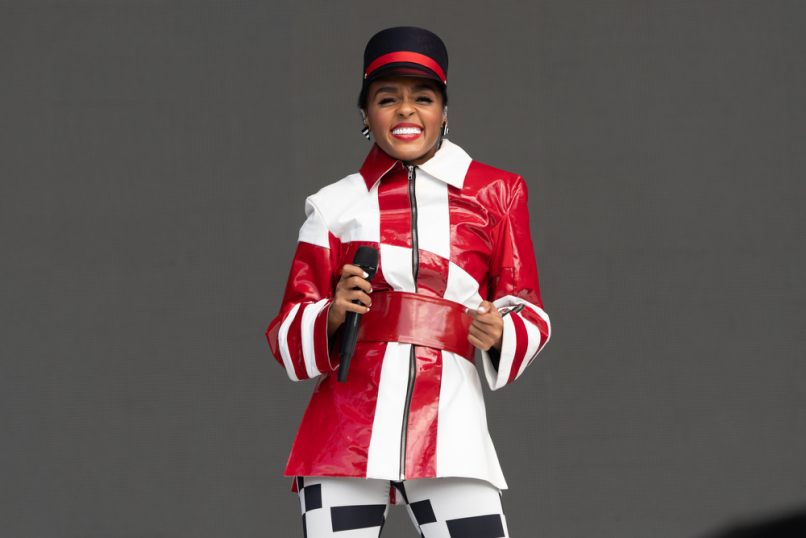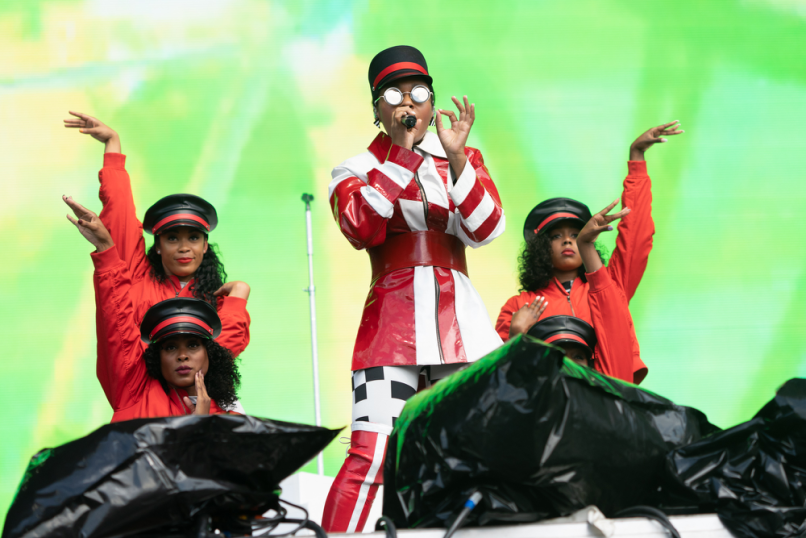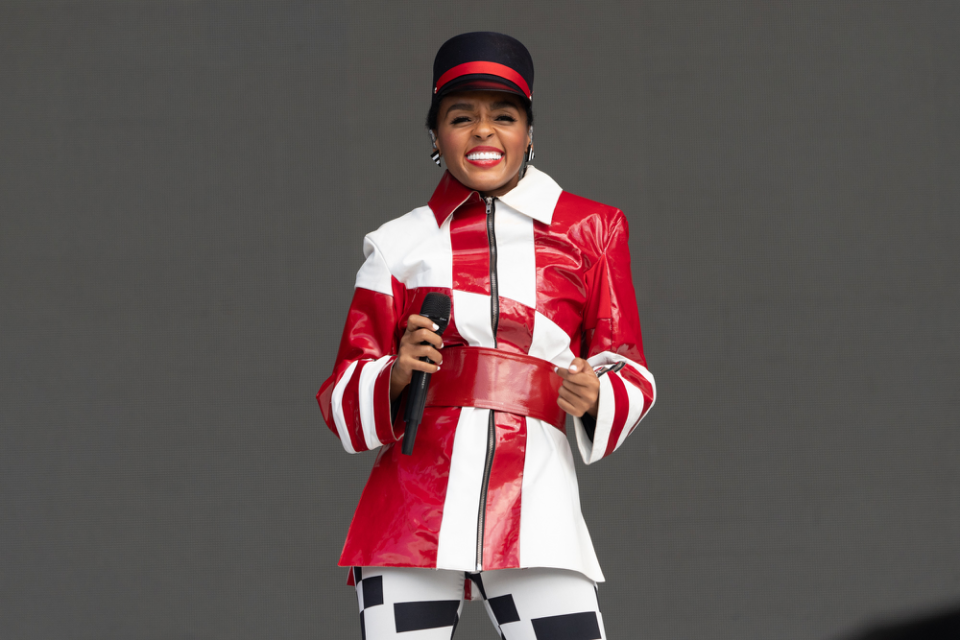Artist of the Year: Janelle Monáe Stood Out This Year by Standing Up for Individuality
In 2018, conversations about the future are sick with if.
If we live to see it. If things get worse instead of better. If the death rattle of patriarchy doesn’t pull all the world with it into the pit.
The gloom of encroaching dystopia is mud that’s tracked everywhere. By everyone. No matter how hard you kick your boots — it remains. Even the sky is muddled with a membrane of white noise.
It’s horrendous.
But in this time of upheaval and unrest, a clear voice can crack the sky like lightning — slicing the clouds of static … and we can see the moon again.
Janelle Monáe is one of those voices — the sound of now. Of fear peeling away. Of the “evolution” in “revolution.” Of hope. Of utopia. Of love flashing its teeth and not going down without a fight.
That’s a lot to put on a pop star. But Monáe and the Wondaland Arts Society have always been looking to the future – and not doing it with an apocalyptic if but a triumphant when. And it just so happens that when begins now.

Monáe understands the language of pop deification. Not like the grotesque worship of “rock gods” or celebrities, but figures like David Bowie, Prince, Kate Bush — pop artists whose music and intent are matched with presence. They take the stage and screen with persona and vision, galvanizing their craft into powerful audiovisual statements that don’t just empower themselves; they empower all. Their humanity is intrinsically bound to their larger-than-life persona — becoming not exclusionary, but inclusionary. This power can be yours too. Make art. Be freaks. Be free. We’ve all got the spark of a deity within us, but sometimes it takes a music maker to snap their fingers and light the fire.
However, in this instance, Monáe goes one step further. With her 2018 record, Dirty Computer, she ascended to high priestess of a revolution – just when the world needs her most. For anyone who feels disenfranchised in America or in the world at large, all our collective trials and fears are there, but that echoed vulnerability is armored in anthems of hope, strength, self-love, and glorious defiance. Tyrants and haters: have your pathetic moment of dystopia. Have your fear. Have your hate. A tribe of love is rising, and the future is ours to make. “You fucked the world up/ Now, we’ll fuck it all back down.”
Monáe came out with courage, color, and cunning in a transmedia tapestry celebrating queerness and otherness in all its beautiful forms and demonstrating the power of pride in a dancable, singable, tearful sonic tapestry. Paired with the poignancy of Dirty Computer is the “Emotion Picture” of the same name, a 50-minute music-driven sci-fi film collaging music videos and the world of Monáe’s continuing concept album story line. And the videos! The fluorescent labia britches of “Pynk”, lighting the desert up with sassy, sapphic feminist fire. “Django Jane”’s enthroning of a rap warrior queen. The indulgent self-actualization of the flamingo milk bath in “I Like That”. The pansexual power party of “Make Me Feel”. And that’s all in addition to the Emotion Picture’s harrowing tale of erasure and love against all odds in an oppressive near future.
Her profile as an actress is also on the rise — Moonlight and Hidden Figures paving the way to the forthcoming Welcome to Marwen and Harriet. But with the Emotion Picture, she and Wondaland Pictures took their first step into a larger world. They’ve now signed a first look deal with Universal to focus specifically on projects that champion underrepresented voices. She’s our Artist of the Year now, but it’s like she’s only getting started.
When we caught up with her, Monáe was taking her first week off in a year and spending some time with her mom. But even still, here she was, speaking with us.
“I’m never off the clock, and that is the reason why I’ve been made to be an android — to deal with this level of high demand and pressures.” She was looking forward to taking time to “download” new ideas. Just take a look at the liner notes to Dirty Computer and it’s easy to see that for Monáe, inspiration is everywhere and nothing is what it seems. The new record, for instance, can be easily assumed to be wholly a byproduct of everything that’s come in the wake of the 2016 American Presidential Election, but in fact, it’s that reality, jarringly, caught up with her fiction. The premise dates back to before her first full-length album, 2010’s The ArchAndroid. She created the majority of the songs during Obama’s presidency.

Janelle Monáe, photo by Heather Kaplan
“I was still working with other spirits in my body and in my mind and my soul to create Dirty Computer, and then, the 2016 election happened — and things changed. There was a shift in the world, there was a shift in the universe, there was a shift physically in America, and there was a shift that I couldn’t ignore. It was a shift that affected me personally and directly.”
Normally, Monáe would swear off going into the studio if she was angry or upset, but circumstances required a different approach.
“I needed to use what I was going through as therapy. Even if I did not have the right words to convey all of my emotions and my thoughts, it was about getting it down, getting down to my studio and making myself available. I knew I was going to be getting deeper, so I opted to send everybody out, record myself, and then I’d say, ‘Hey, come back here!’
“They would always say, ‘You need to record yourself more often, because you’re more in tune with what you want to say when you’re by yourself recording,'” she continues. “And, you know, I agree. I love collaboration. I think that’s when innovation happens, but I also love being in solitude while recording, because I can discover myself and evolve.”
“Sometimes the water is just not on in terms of creativity. Sometimes there’s a drought. But there was a lot of water with this project. I wrote ‘Americans ‘in two days, and usually I take a minute to write my songs. There was something flowing through me with this album. Something flowing through me when I wrote ‘So Afraid’ in my car on the way to the dentist.
“I feel like the timing of this release has made it accessible to now,” she adds. “Part of me feels bad about that, but I realize that you can’t stop an idea when the idea’s time has arrived. So what you see in this album is me going through different stages of what it means to be a ‘dirty computer’ and what a dirty computer represents in society as of today.”
In terms of chronology, Dirty Computer is a prequel piece. The ArchAndroid and Electric Lady are set in the far-flung future of 2719. If you thought the repercussions of being a human-loving android were trouble, that’s not half as bad as being a subversive “dirty computer” in the near future.

Janelle Monáe, Austin City Limits 2018, photo by Amy Price
The album goes through three different stages: The Reckoning, The Celebration, and The Reclamation.
“The first two songs [‘Dirty Computer’, ‘Crazy, Classic Life’] deal with reckoning. What does it mean to have the majority of the world that you live in view you as a dirty computer? I would parallel that to being called ‘nigger ‘for the first time by a white person. I would compare it to being called ‘bitch’ for the first time by a man.
“Being a ‘dirty computer’ is a derogatory word,” she clarifies, “you are dirty and you need to be cleansed. There is something about you that is not good enough to live in society, until you change, and unless you conform to our standards, we won’t accept you. We’ll push you to the margins of society, and you won’t matter.”
The stage is set, and it’s bleak … but then comes “The Celebration” — the narrative of deciding if you’re going to celebrate what it means to be a dirty computer. Unapologetically celebrating your sexuality, your liberation as a woman, the things that make you unique, even if they make others uncomfortable. “The Reclamation” reclaims all that and what it means to be American. Claiming the freedom of the American ideal, unchained from the prejudices that wound and infect that ideal.
“This album is through the lens of a young, black, queer woman living in America, and I wanted to make an album that was uplifting, not one that stayed in a dystopian world. I wanted to make sure that we felt like there was something that we could do to not hide, to create community, to remind each other that although we are dirty computers, we too are human, we too are American, and we deserve basic rights of respect and love. I wanted to end the album on that hope of what it means to be an American. Our differences are what allow us to evolve and learn from each other, to help each other.”
With as close to the bone as this record cuts, in regards to our own world’s timeline and Monáe’s own journey, it’s easy to suspect that Dirty Computer is more about Janelle Monáe than her characters Jane 57821 or Cindi Mayweather, but that’s a take she’s quick to refute. The characters cast a long shadow, and it’s all connected, but the message is bigger than them and bigger than Monáe.

Janelle Monáe, photo by Heather Kaplan
“I don’t consider this a personal essay from Janelle Monáe. I look at myself as an evolving spirit,” Monáe explains. “I am a part of humanity. I don’t exist unless people say I exist, so I never look at myself and say, ‘This is me, this is who I am.’ I’m still finding who I am. I’m still discovering who I am. I’m still allowing my metamorphosis to take place, and I’m creating through it. I hope that I’m digging deeper, I hope that I’m not allowing even myself to get in the way of creating an album that is meant for the community of people that I want to uplift.
“That’s what this album is really about,” she contends. “I am a part of the community, but this album is not just about me, it’s about creating space for us — for us who challenge the status quo, for us who love out loud, who live out loud, who may not share the same religious beliefs, but we respect and admire and appreciate each other. We live in a civilization where we depend on each other for survival, and I think this album boils down to that fundamental question of: ‘Do you feel a responsibility to protect those who may not be as privileged as you?'”
Monáe has proudly assumed a figurehead role in the queer community that embraced her long before she’d made any definitive statements about her sexuality. It’s a role not just centered on celebration, but solidarity. On her tour stop in Orlando, FL, Monáe performed at Disney Springs’ House of Blues, where the gunman responsible for the Pulse Massacre had initially scouted to stage his shooting before before backing down and targeting the nightclub. Taking the stage for her encore, Monáe addressed the crowd, reading the names of the 49 victims, and paying respects to Sasha Garden, a trans woman murdered in Orlando the week prior.
“We celebrate them tonight,” she said. “We celebrate their bravery. I send love to all their families and friends – some of you may be here tonight. This was a difficult show. When I started my first song, I was very emotional performing here … We never forget them.”
The moment was further punctuated as she slid into a potent performance of “So Afraid”. For the audience, and Monáe, too, it was a sobering, tear-jerking, and undeniably raw gesture of togetherness in a sometimes terrifying world.

Janelle Monáe, photo by Heather Kaplan
“I felt that I couldn’t come there and not recognize those heroes, you know? I decided to make it very clear that all of my brothers and sisters in the LGBTQIA+ community, you all have my support, and I’m here, and we’re going to choose our freedom over our fear.”
Dirty Computer is resplendent with messages of love, but plenty of complications, too, like the artist herself. “Dirty computer” is a slur. “Dirty computer” is a badge of honor. In Dirty Computer, imperfection is celebrated.
“I didn’t set out to make a perfect album. That wasn’t my goal,” Monáe argues. “I have definitely gone in the studio and said, ‘Hey, I want to make the perfect song.’ This was not about that. It was about the imperfections. How can I create an album that can be imperfect? When I’m recording, I feel like I have to be perfect in front of people. I’m grateful to have a team that I don’t feel that way in front of, but I try to make sure that I’m giving myself space to just mess around and have fun and get lost. I like getting lost and discovering myself all over again.
“I’m at a point in my life where I’m questioning what it means to embrace the things that make me unique, even if it makes others uncomfortable. Those who hate others because of religious belief or they’re mean-spirited or they’re homophobic, is that what makes them unique? Should we still love them? I think that is a question that we have to ask ourselves.”
In “Stevie’s Dream”, Stevie Wonder delivers wise words about speaking love: “Don’t let your expressions, even of anger, be confused or misconstrued. Turn them into words of expression that can be understood by using words of love.” It’s easier said than done.
“There are some people that I have a really difficult time loving, especially when they are so divisive at the root. For me … you still have to be accountable. You can love somebody, and respect them and empathize with them, but part of loving a person is holding them accountable.
“[Stevie Wonder would] tell me all the time to ‘lead with love.’ It’s difficult. I don’t want people to think it’s easy and that Janelle Monáe is above having moments where I sometimes don’t believe the things that I say. But I said them, and I believe that they come from a great place. I’m speaking from my loving mind. Sometimes, I’m happy I’ve recorded it, because I need to be inside that, and I don’t always feel like that.

Janelle Monáe, Austin City Limits 2018, photo by Amy Price
“I just want this album to be words of affirmation for anybody that’s struggling with accepting themselves,” she insists, “especially in a world where we have been programmed to not accept dirty computers. I just hope that everybody feels loved and seen and heard and that they can use this work to heal — to be the soundtrack of a better tomorrow.”
With Wondaland Pictures’ new deal, there could be a lot of soundtracking to do. Universal Pictures Chairman Donna Langley championed the deal and has made a career of putting an emphasis on empowering women and storytellers, a perfect pairing with Monáe, Mikael Moore, Chuck Lightning, and Nate Wonder.
“We look at ourselves not as musicians or artists specifically restricted to the music industry,” Monáe says. “We’ve always loved film, we’ve always loved TV, and we’ve always loved telling stories. [This is] an extension of that storytelling and an opportunity to collaborate.
“‘Collaboration’ is my word for next year,” she adds. “I hope to do more collaboration with my peers. I hope to also work with up-and-coming talent, of voices and directors and storytellers who, like us, want to shape this world through our storytelling and want to make sure that the representation of the people we feel have been underrepresented happens. We want to redefine what it means to tell stories, to tell universal stories in unforgettable ways.”
That declaration would be a tall order or hot air from almost anyone else, but the persistence of Monáe’s vision is inarguable. She has set her sights on the future and has seized the present with futurist music — science fiction music that does what great science fiction does: distilling human nature into its core components. Reflecting us as we are so we can become a better version of ourselves.




